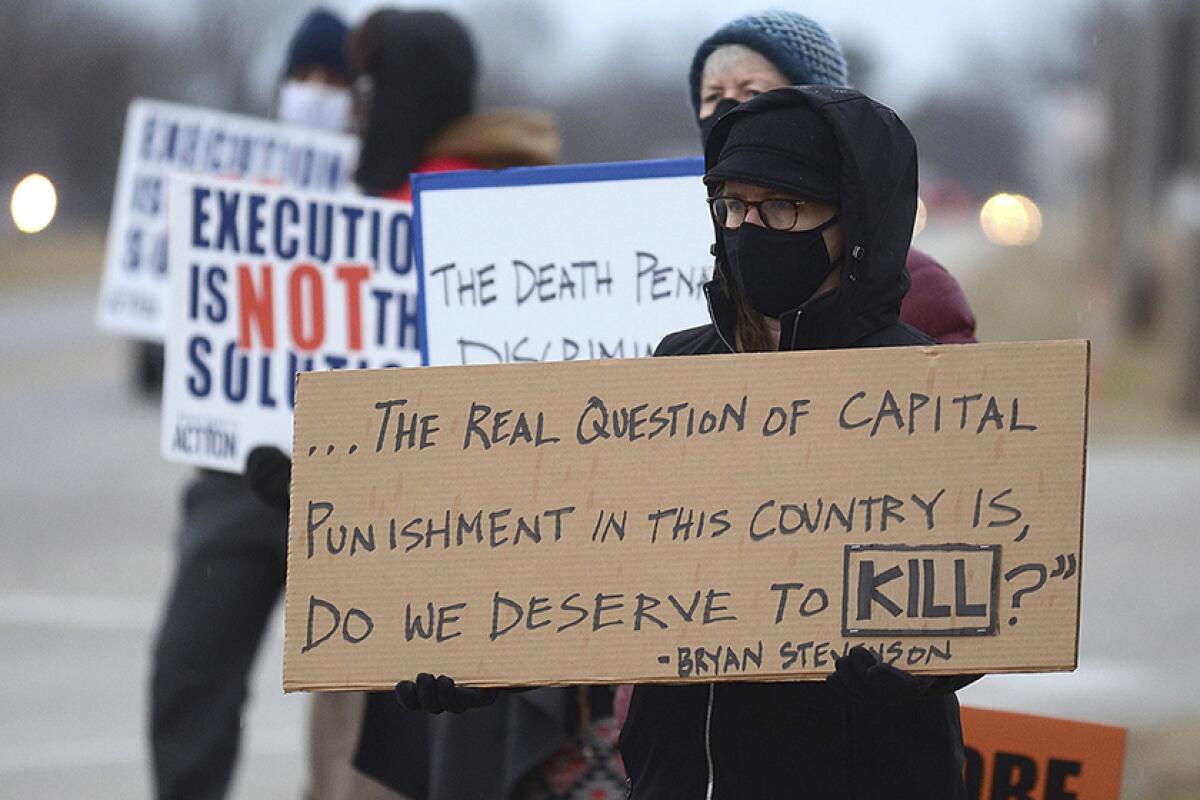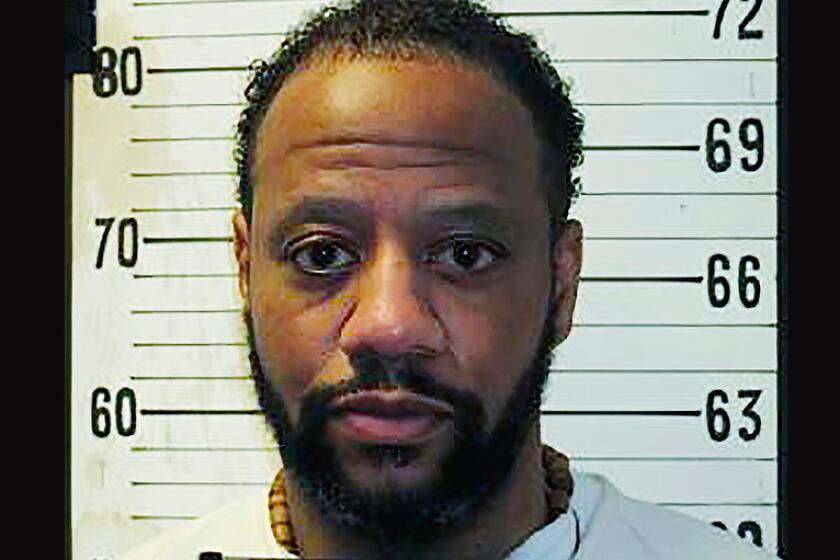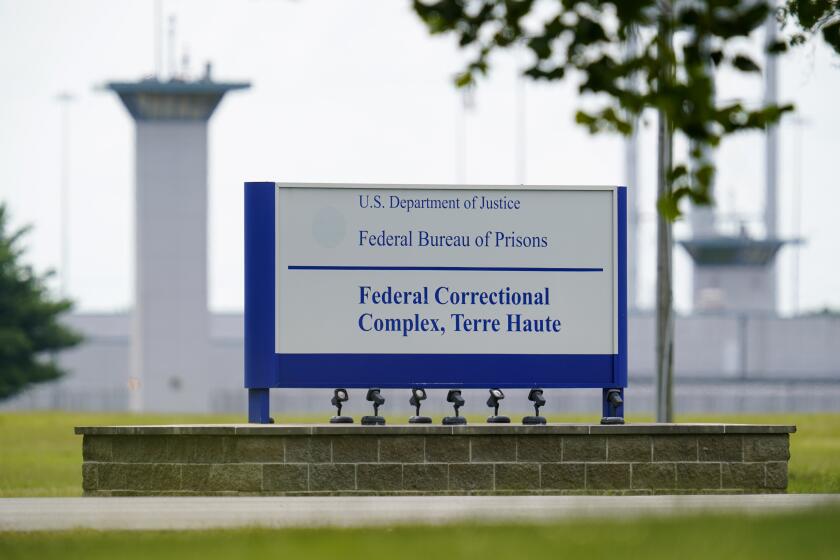U.S. executes drug trafficker tied to Virginia killings

- Share via
The U.S. government executed a drug trafficker Thursday for his involvement in a series of slayings in Virginia’s capital city in 1992, despite assertions by his lawyers that the lethal injection would cause excruciating pain due to lung damage from his recent COVID-19 infection.
Corey Johnson, 52, was the 12th inmate put to death at the federal prison complex in Terre Haute, Ind., since the Trump administration restarted federal executions after a 17-year hiatus.
He was pronounced dead at 11:34 p.m.
When he was asked if he had any last words, Johnson appeared surprised and distracted, focusing on a room to his left designated for members of his family. Still, glancing around, he responded to the question, “No. I’m OK.” Several seconds later, he said softly while gazing intently at the same room, “Love you.”
As the lethal drug began flowing through IVs into his arms, which were strapped down on a cross-shaped gurney, Johnson lifted his arm at the wrist and waved to someone in a room for his family. A low murmur emanated from the room for Johnson’s family in which someone seemed to be praying and offering words of assurance to Johnson. For two minutes after the lethal injection began, Johnson continued to try to speak to someone out of view of reporters. But suddenly, his eyelids drew down hard and his mouth fell agape. He moved only slightly after that.
The report traces a line from historical lynchings to current executions, showing how Black inmates have been overrepresented on death row.
After an official announced that Johnson was dead, clapping could be heard coming from another of the witness rooms and someone also could be heard whistling.
Johnson’s execution and Friday’s scheduled execution of Dustin Higgs are the last before next week’s inauguration of President-elect Joe Biden, who opposes the federal death penalty and has signaled he’ll end its use. Both inmates contracted COVID-19 and won temporary stays of execution this week for that reason, only for higher courts to allow the lethal injections to move forward.
Lawyers have previously argued that lethal injections of pentobarbital caused flash pulmonary edema, in which fluid rapidly fills the lungs, sparking sensations akin to drowning. The new claim was that fluid would rush into the inmates’ COVID-damaged lungs immediately while they were still conscious.
Johnson was implicated in one of the worst bursts of gang violence Richmond had ever seen, with 11 people killed in a 45-day period. He and two other members of the Newtowne gang were sentenced to death under a federal law that targets large-scale drug traffickers.
In their clemency petition, Johnson’s lawyers described a traumatic childhood in which he was physically abused by his drug-addicted mother and her boyfriends, abandoned at age 13, then shuffled between residential and institutional facilities until he aged out of the foster care system. They cited numerous childhood IQ tests discovered after he was sentenced that place him in the mentally disabled category and say testing during his time in prison shows he can read and write at only an elementary school level.
In a final statement provided by his attorneys, Johnson said he was “sorry for my crimes” and said he wanted the victims to be remembered. He said the pizza and strawberry shake he ate and drank before the execution “were wonderful” but he didn’t get doughnuts he wanted. He also thanked his minister and lawyer.
“I am okay,” he said in the statement. “I am at peace.”
In a statement, Johnson’s lawyers said the government executed a person “with an intellectual disability, in stark violation of the Constitution and federal law,” and vehemently denied he had the mental capacity to be a so-called drug kingpin.
The Justice Department is amending its execution protocols, easing a requirement that federal death sentences be conducted by lethal injection.
“The government’s arbitrary rush to execute Mr. Johnson, who was categorically ineligible for execution due to his significant impairments, rested on procedural technicalities rather than any serious dispute that he was intellectually disabled,” the attorneys, Donald Salzman and Ronald Tabak, said.
Government filings have spelled Johnson’s name “Cory,” but his lawyers say he spells it “Corey.”
Richard Benedict, who was Johnson’s special education teacher at a New York school for emotionally troubled kids, said Johnson was hyperactive, anxious and reading and writing at a second- or third-grade level when he was 16 and 17.
“I had to have someone walk him to the bathroom because he just couldn’t get back to the classroom,” Benedict said.
Prosecutors, however, said Johnson had not shown that he was mentally disabled.
“While rejecting that he has intellectual disabilities that preclude his death sentences, courts have repeatedly and correctly concluded that Johnson’s seven murders were planned to advance his drug trafficking and were not impulsive acts by someone incapable of making calculated judgments, and are therefore eligible for the death penalty,” prosecutors argue in court documents.
A defense psychologist testified during the trial that Johnson’s IQ was measured at 77, above the threshold score of 75 then needed to label someone as intellectually disabled. Johnson’s appellate lawyers say that psychologist was not an expert in intellectual disability and relied on standards that are now outdated.
C.T. Woody Jr., the lead homicide detective on the case, said that during his interrogations of Johnson, he denied any involvement in the killings and said police were trying to frame him because of lies people were telling about him.
“It did not seem to me that he had any kind of mental problems at all except his viciousness and no respect for human life — none whatsoever,” Woody said.
Former Assistant U.S. Atty. Howard Vick Jr., one of the prosecutors in the case, said the violence committed by Johnson and his fellow gang members was unmatched at the time. One of the gang’s victims was stabbed 85 times and another was shot 16 times. Johnson was convicted of being the shooter in a triple slaying, and participating in four other capital murders, including shooting a rival drug dealer 15 times.
More to Read
Sign up for Essential California
The most important California stories and recommendations in your inbox every morning.
You may occasionally receive promotional content from the Los Angeles Times.












